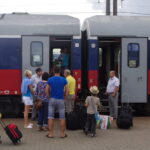That Was Then . . . This Is Now.
Back in the early 1970s, in exchange for the government’s permission to quit carrying passengers, the nation’s railroads agreed to allow Amtrak trains to run on their tracks for modest-but-fair payments. As their part of the deal, the railroads agreed that the dispatchers controlling the movements of all the trains in their area would give preference to the Amtrak trains when they appeared once or twice a day.
But that’s not how it’s worked out. If the freight railroads could shepherd the passenger trains through to the end of its route without any significant disruption to freight operations, they would do so. But when a choice had to be made, more and more frequently, Amtrak trains were guided onto sidings so freight trains could stay “on time’ to their destinations.
Passengers are upset by the delays and by the late arrivals and they complain, but in most cases to the wrong party—they blame Amtrak.
Here are some average numbers for the year 2019, the last complete non-pandemic year:
Sunset Limited, L.A. to New Orleans 2 hrs. 44 min. late
Calif. Zephyr, Chicago to Emeryville 1 hr. 55 min. late
Southwest Chief, L.A. to Chicago 1 hr. 39 min. late
Crescent, New York to New Orleans 1 hr. 52 min. late
Remember: these are the average delays for each of those trains. While there were indeed many on time arrivals, there also were trains that ran very, very late. And when that happens, individual travelers pay the price. I have a personal example.
Three years ago, I took the Crescent from Washington to New Orleans, where Amtrak’s schedule said we would arrive at 9:00 p.m. We finally came to a stop in the station at just after 1:00 a.m. The official reason for our late arrival: freight traffic. The Norfolk Southern dispatchers didn’t show much “preference” to the Crescent that night. For that matter, neither did my hotel. When I showed up with a reservation and badly in need of a shower and some sleep, I discovered I had been written off as a no-show and my room had been sold to someone else.
There were more than a hundred people on the train that night and every one of us was inconvenienced and most were put to some extra personal expense because of the very late arrival.
In recent years, the freight railroads have gone to court several times in attempts to free themselves from the obligation they themselves had agreed to when Amtrak was created. In at least two of these cases, the Rail Passengers Association was a party to the proceedings.
May I suggest that support of RPA is an excellent way to help preserve the tradition of passenger trains in this country. If you travel by train, RPA is fighting your battle for you. A link to the RPA website is just below. Please consider becoming a member.



The RPA and its minions would do themselves and everyone else a favor and check out the Amtrak Alerts twitter feed. There are an abundance of delays that are Amtrak’s own fault. Maintenance issues, mechanical breakdowns, and unexpected crew changes, and heat-related restrictions. It is absurd to blame the Freight Roads for all of Amtrak’s woes to be blamed on the freight roads, when many times they make a conscious effort to run Amtrak on-time.
Interested in a winter time (FEB) train trip Chicago to Seattle for “sightseeing” adventure. Two senior adults in a bedroom accommodation,
perhaps with 1-2 small pug dogs. What would be my options?